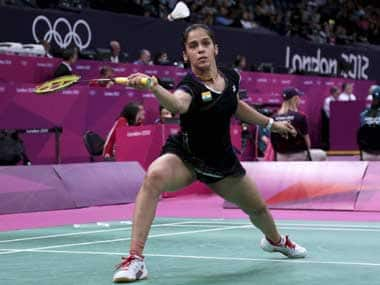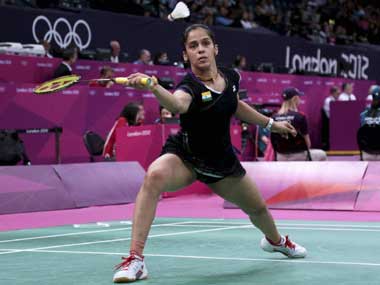by Vishnu Vasudev Both P Kashyap and Saina Nehwal are in the quarterfinals of the badminton competition. As a lay Indian fan brought up on a surfeit of cricket, watching these two champions play have been the two best experiences from the Olympics. Not so much because they are winning, not even because of the way they win their points, but because of the way they conduct themselves between points. Saina owns the court. Just the way she walks back to her position after a point shows intent, focus and a sense of inevitability – she would win, it is just a matter of when and how. She walks briskly but unhurriedly on to her starting position, and she has already forgotten the previous point. She shows only two types of reactions. The first a fist pump that is never unveiled against the grain of play – it is never used as a way to establish confidence (that would indicate that she needs a boost), but as a way to emphasise her dominance once she is in complete control. The second is a cheeky smile after she commits an unforced error – as though she is signaling to the errant shot that it may have gotten away this time, but there better not be a next time – a gentle, final, warning. And yet there is no overconfident swagger of one entitled to a victory. Even if she loses, as she eventually may, you can be sure that she gave it everything and did not cede an inch, psychological or otherwise, to her opponent. [caption id=“attachment_401541” align=“alignleft” width=“380”]
 Saina shows no overconfident swagger of one entitled to a victory. PTI[/caption] Kashyap is similar in his body language. Even when at the losing end of a run of points, and even after having to pick himself up off the floor after an unedifying scramble, he walks back with a quiet sense of confidence. He takes his time when he needs it – with a slow but not languid walk to get a new shuttle. After he lost the second set to Karunaratne, you knew that he would win the third, or die trying. In contrast, the Jwala Gutta-Ashwini Ponnappa pair take us back to what we seem to do best – whine after losing out. Sure, they won two matches, but so did Japan and Taipei. The rules are the same for everyone, and established before the tournament starts. If you cannot be bothered to find out what those rules are, however complicated they may be, tough. To talk of being robbed of a rightful place in the quarters is senseless – they would have had their rightful place if they had won all their matches. And to then opportunistically make use of the ongoing match throwing scandal to level a charge against the Japanese pair, is not only senseless, but graceless. In even starker contrast was the body language of the Indian archers. All of them looked immediately annoyed with themselves when they shot an 8, and slumped their shoulders. In a sport in which is about mental fortitude and finely tuned technique, you knew they stood no chance. The women archers in particular let out nervous giggles and “what to do — it is all up to God” expressions in between their sets. Their coach also seemed a bit overwhelmed, happy just to be at Lord’s. Only Tarundeep Rai and Rahul Bannerjee showed some semblance of control. And finally, we seem to have made some progress on the cricket field as well. Virat Kohli seems to have discovered belatedly that scoring a century is a joyful occasion and now smiles beatifically rather than cursing the @**@ out of the world at large.
Saina shows no overconfident swagger of one entitled to a victory. PTI[/caption] Kashyap is similar in his body language. Even when at the losing end of a run of points, and even after having to pick himself up off the floor after an unedifying scramble, he walks back with a quiet sense of confidence. He takes his time when he needs it – with a slow but not languid walk to get a new shuttle. After he lost the second set to Karunaratne, you knew that he would win the third, or die trying. In contrast, the Jwala Gutta-Ashwini Ponnappa pair take us back to what we seem to do best – whine after losing out. Sure, they won two matches, but so did Japan and Taipei. The rules are the same for everyone, and established before the tournament starts. If you cannot be bothered to find out what those rules are, however complicated they may be, tough. To talk of being robbed of a rightful place in the quarters is senseless – they would have had their rightful place if they had won all their matches. And to then opportunistically make use of the ongoing match throwing scandal to level a charge against the Japanese pair, is not only senseless, but graceless. In even starker contrast was the body language of the Indian archers. All of them looked immediately annoyed with themselves when they shot an 8, and slumped their shoulders. In a sport in which is about mental fortitude and finely tuned technique, you knew they stood no chance. The women archers in particular let out nervous giggles and “what to do — it is all up to God” expressions in between their sets. Their coach also seemed a bit overwhelmed, happy just to be at Lord’s. Only Tarundeep Rai and Rahul Bannerjee showed some semblance of control. And finally, we seem to have made some progress on the cricket field as well. Virat Kohli seems to have discovered belatedly that scoring a century is a joyful occasion and now smiles beatifically rather than cursing the @**@ out of the world at large.
Dear Jwala-Ashwini, time you learnt from Saina
FP Archives
• August 2, 2012, 11:51:22 IST
While Saina and Kashyap show intent and focus on court, Jwala and Ashwini showed complete lack of grace when they opportunistically made use of the ongoing match throwing scandal to level a charge against the Japanese pair.
Advertisement
)